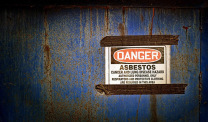U.S. Nuclear Missile Bases Under Investigation for Cancer Risks
Asbestos Exposure & BansWritten by Travis Rodgers | Edited By Amy Edel

The U.S. Air Force is investigating nuclear missile bases for asbestos and other potentially cancer-causing materials. The Associated Press recently revealed that the issues date as far back as the late 1980s. Reports prove that the Air Force has been aware of toxic chemicals at nuclear launch silos for decades.
Air Force documents reveal details about several leaks and spills at missile bases across the country over the course of several years. Records describe repeated spills or leaks affecting service members working at the sites. The documents reveal internal reports of asbestos leaks at missile silos in 1989, as well as asbestos issues labeled “priority” from 1992. Some missile bases found asbestos readings to be 50 times higher than the Environmental Protection Agency’s safety standards.
One incident from 1987 caused personnel to experience headaches and nausea after a polychlorinated biphenyls leak. PCBs are a group of human-made chemical compounds once used in consumer and industrial products that the U.S. has now banned.
The Air Force is now working to get an official count to find out exactly how many current and former service members who work with missiles have cancer. They’re expected to release that data later in 2024. The AP reported in January 2023 that at least 9 current or former nuclear missile officers or missileers were diagnosed with non-Hodgkin’s lymphoma.
“It’s frustrating to know they had thought of this back then,” Doreen Jenness, whose husband, Jason Jenness, was a missileer at Malmstrom Air Force Base in Montana and died of non-Hodgkin’s lymphoma in 2001 at the age of 31, told the AP. “It makes me frustrated and angry that they can keep telling these young men and women that they are not finding anything — knowing that back in 2001, 2003 and the early 2000s that there was something going on there.”
Cancer Study
The Air Force plans on studying the entire missile community, not just nuclear site personnel. Thousands of tests are taking place in and around all 3 nuclear missile bases in the U.S. Air, soil, water and surface areas are being examined at F.E. Warren Air Force Base in Wyoming, Malmstrom Air Force Base in Montana and Minot Air Force Base in North Dakota.
Early test results show unsafe levels of PCBs in four underground launch control capsule locations where missileers work. Thousands of air, soil and water samples from bases in Montana and Wyoming haven’t detected any harmful levels of contamination.
However, missile launch operators from the past could have been exposed to contaminants like asbestos, dating as far back as the first digging of the underground capsules in the 1960s. Asbestos exposure is the primary cause of malignant mesothelioma cancer. Authorities have yet to release results from the North Dakota missile base.
Former Malmstrom missileer Jackie Perdue, who was diagnosed with non-Hodgkin’s lymphoma, asked the Defense Department’s inspector general to investigate in December 2022. In an inspector general complaint the Associated Press obtained, Perdue said, “I believe health and safety standards have been violated or not considered and should be investigated.”
Expanded Data Project
The Air Force’s goal is to obtain data on all missile community members who served between 1976 and 2010. To aid with the testing process, the Air Force is expanding its review of medical records in hopes of including as many service members as possible.
The Department of Defense began using electronic medical records in 2001. Plans are to go further back, as far as 1976, and to include data from both the Department of Veterans Affairs and state cancer registries.
In a statement, the Air Force said, “The limitations that were discovered with this initial dataset is driving us to open the aperture to ensure that we are capturing as many cases as possible, particularly among those who previously served in missile related career fields.”






